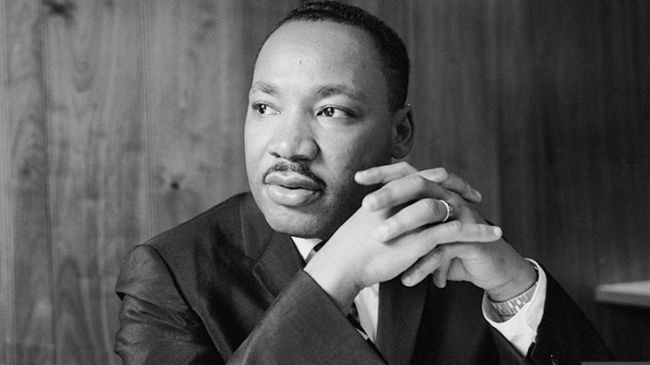A Dream of Equality of Opportunity
August 2017

“A dream of equality of opportunity, of privilege and property widely distributed; a dream of a land where men will not take necessities from the many to give luxuries to the few.”
Martin Luther King, December 11, 1961
Civil rights leader Martin Luther King is perhaps best known for his iconic 1963 I Have a Dream speech. Many of us memorized parts of it while in school. The speech is one of the most famous and inspiring speeches of all time, and with good reason. Less is known about predecessors to that speech. This month, we look back at a speech King gave to the Fourth Constitutional Convention of the AFL-CIO in December 1961.
This unity of purpose is not an historical coincidence. Negroes are almost entirely a working people. There are pitifully few Negro millionaires and few Negro employers. Our needs are identical with labor's needs: decent wages, fair working conditions, livable housing, old-age security, health and welfare measures, conditions in which families can grow, have education for their children, and respect in the community. That is why Negroes support labor's demands and fight laws which curb labor. That is why the labor-hater and labor-baiter is virtually always a twin-headed creature, spewing anti-Negro epithets from one mouth and anti-labor propaganda from the other mouth.
The duality of interests of labor and Negroes makes any crisis which lacerates you a crisis from which we bleed. And as we stand on the threshold of the second half of the twentieth century, a crisis confronts us both. Those who in the second half of the nineteenth century could not tolerate organized labor have had a rebirth of power and seek to regain the despotism of that era, while retaining the wealth and privileges of the twentieth century.
...I look forward confidently to the day when all who work for a living will be one, with no thought of their separateness as Negroes, Jews, Italians, or any other distinctions. This will be the day when we shall bring into full realization the dream of American democracy, a dream yet unfulfilled. A dream of equality of opportunity, of privilege and property widely distributed. A dream of a land where men will not take necessities from the many to give luxuries to the few. A dream of a land where men will not argue that the color of a man's skin determines the content of his character. A dream of a nation where all our gifts and resources are held not for ourselves alone, but as instruments of service, for the rest of humanity. The dream of a country where every man will respect the dignity and worth of human personality—that is the dream. And as we struggle to make racial and economic justice a reality, let us maintain faith in the future. At times we confront difficult and frustrating moments in the struggle to make justice a reality, but we must believe somehow that these problems can be solved.
Here, King connects the civil rights movement with the labor movement, and explores their common goals, and common enemies. And he does so with colorful and evocative language, like, "That is why the labor-hater and labor-baiter is virtually always a twin-headed creature, spewing anti-Negro epithets from one mouth and anti-labor propaganda from the other mouth." If you'd like to read the entire speech, please click here.
This is the second in our series of posts about Martin Luther King, Jr., to mark the 50th anniversary of his assassination in Memphis, Tennessee, on April 4, 1968. Click here to read the first installment.
Next, read the third installment here, about how Martin Luther King improvised the most iconic speech of the last century.
